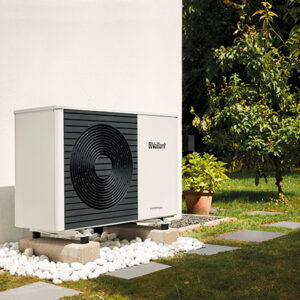
Vaillant AroTherm Plus
As the world strives to mitigate climate change and reduce dependence on fossil fuels, sustainable alternatives for heating and cooling our homes are gaining significant attention. Among these alternatives, air source heat pumps (ASHPs) have emerged as a highly efficient and environmentally friendly solution. In this blog post, we will explore the numerous benefits that ASHPs offer, highlighting their potential to revolutionize the way we heat and cool our homes.
Energy Efficiency
One of the primary advantages of air source heat pumps is their exceptional energy efficiency. ASHPs work by extracting heat from the ambient air, even in colder climates, and transferring it indoors to provide warmth. For every unit of electricity consumed, an ASHP can generate more than three units of heat. Compared to standard tariff electrically heated systems, such as electric radiators, heated fan blowers or infrared radiators ASHPs can offer energy savings of around 80%.

Cost Savings
The high energy efficiency of ASHPs translates into tangible cost savings for homeowners. By significantly reducing energy consumption for heating, ASHPs can lower utility bills and offer long-term savings. Although the initial investment may be higher than traditional heating systems, the operational savings over time can offset the upfront costs, leading to a positive return on investment. Additionally, in regions with access to renewable electricity, such as solar or wind power, the cost savings can be even more substantial.
Modern Gas boilers are often around 85% efficient. Although the cost per unit is much lower than electricity, a well installed Air Source Heat pump will still see an energy cost reduction. A reduction that will only rise as the gas prices and electricity prices come ever closer.
Versatile Heating and Cooling
Air source heat pumps are versatile systems that provide both heating and cooling capabilities. During colder months, they extract heat from the outside air and distribute it indoors, keeping your home warm and comfortable. In warmer months, the system can be reversed to remove heat from your living spaces. This dual functionality eliminates the need for separate heating and cooling systems, simplifying your home’s HVAC setup and reducing maintenance and installation costs.

Reducing CO2 emissions.
Environmentally Friendly
ASHPs are considered a greener alternative to traditional heating systems due to their minimal carbon footprint. By harnessing heat energy from the air, they consume significantly less electricity than conventional electric heating systems. This reduced energy demand leads to a reduction in greenhouse gas emissions. Promoting a more sustainable and environmentally friendly approach to home heating.
Energy Independence
Unlike systems dependent on fossil fuels, ASHPs rely on electricity as their primary energy source. This opens up opportunities for homeowners to achieve energy independence by generating their electricity through renewable sources. By combining an ASHP with solar panels and batteries, homeowners can create a self-sufficient energy system, reducing their reliance on the grid and contributing to a more decentralised and resilient energy future.
Low Maintenance
Air source heat pumps are generally low-maintenance systems, requiring minimal attention compared to other heating options. They have fewer mechanical parts, no fuel storage requirements reducing the risk of malfunctions and breakdowns. Routine maintenance typically involves cleaning or replacing air filters, checking refrigerant levels, and inspecting the outdoor unit. With regular servicing, an ASHP can provide reliable and efficient heating and cooling for many years.
In Conclusion
Heat pumps offer a host of benefits that make them a compelling choice for homeowners. From efficiency and cost savings to environmental friendliness and versatility. Heat Pumps provide a sustainable solution for heating and cooling homes. Embracing this technology not only reduces our carbon footprint but also helps pave the way for a more resilient and decentralised energy future. With ongoing advancements in Heat Pump technology and increasing awareness of their benefits, these systems are poised to play a significant role in shaping the future of heating.
